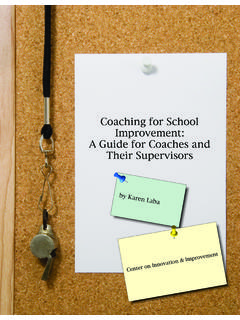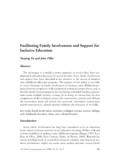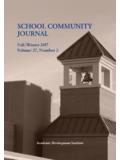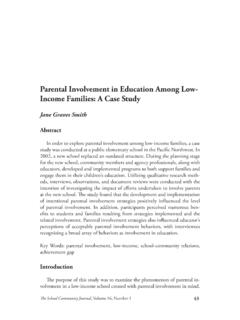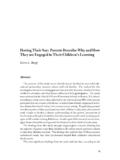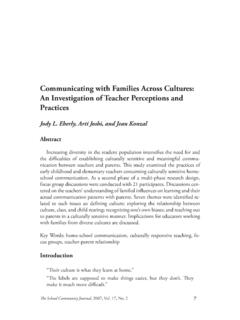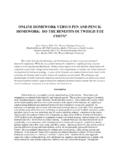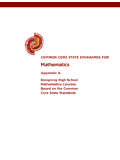Transcription of Increasing the Effectiveness of Homework for All …
1 169 School Community Journal, 2013, Vol. 23, No. 1 Increasing the Effectiveness of Homework for All Learners in the Inclusive ClassroomNicole Schrat CarrAbstractThis article discusses how teachers can increase the Effectiveness of Homework assignments for all learners. Homework , when designed and imple-mented properly, is a valuable tool for reinforcing learning. This essay provides a summary of educational research on Homework , discusses the elements of ef-fective Homework , and suggests practical classroom applications for teachers. The synthesis of these three areas is intended to supplement the literature on Homework in order to help preprofessional and current teachers increase the Effectiveness of Homework and employ best practices in inclusive classroom settings.
2 With the Increasing number of students with special needs included in general education settings and the Increasing pressure placed on students to make academic gains on standardized tests, it is more important than ever that teachers are equipped with the tools necessary to effectively use Homework as a learning tool for all students regardless of their ability Words: Homework , learning, inclusive classrooms, special education, stu-dents with disabilities, supports, teachers, inclusion, parents, studying, homeIntroduction Homework is often a contentious issue for students, parents, and teach-ers. When utilized properly, Homework can be a valuable tool for reinforcing learning that takes place in the classroom.
3 Unfortunately, many teachers do not SCHOOL COMMUNITY JOURNAL170use Homework effectively. Teachers can improve their utilization of Homework by using research-tested strategies and accommodations (McNary, Glasgow, & Hicks, 2005). However, finding the time to read research, understand its im-plications, and then apply them can be a challenge for time-strapped teachers. The purpose of this article is to provide a summary of Homework research, out-line the elements of effective Homework , and provide practical suggestions for classroom the Effectiveness of Homework is a multifaceted goal. Accom-modations, organization, structure of assignments, technology, home school communication, and students home life all influence the Effectiveness of Homework .
4 Teachers are often given the additional challenge of differentiating instruction for students with a wide range of abilities and varying exception-alities. Studies have found that students with disabilities experience more difficulty with Homework than their classmates without disabilities (McNary et al., 2005). Other students may require an additional challenge in order to receive the most benefit from Homework . As inclusive classrooms are more of-ten than not the norm in the , teachers must recognize that students often need accommodations in the way Homework is organized and structured in order for it to be most effective. As student performance and achievement are increasingly placed under scrutiny, teachers are under more pressure than ever to produce results on stan-dardized tests.
5 Research indicates that, along with classroom instruction and students responses to class lessons, Homework is an important factor that in-creases student achievement (Cooper, Robinson, & Patall, 2006; Keith & Cool, 1992; Keith et al., 1993; Paschal, Weinstein, & Walberg, 1984). Although re-sults vary, meta-analytic studies of Homework effects on student achievement report percentile gains for students between 8% and 31% (Van Voorhis, 2011, p. 220). If teachers can learn to utilize research-based best practices to increase the Effectiveness of Homework , they will have a powerful tool for helping stu-dents make academic gains and perform to the best of their ability.
6 Summary of ResearchHomework is often a hot-button issue for schools and is thus a frequent top-ic of educational research. Harris Cooper, a leading expert on the relationship between Homework and achievement, defines Homework as tasks assigned by school teachers that are meant to be carried out during noninstructional time (Bembenutty, 2011b, p. 185). There is considerable debate over the effective-ness of Homework among researchers, administrators, teachers, parents, and students. In 2006, Cooper, Robinson, and Patall conducted a meta-analysis of Homework FOR INCLUSIVE CLASSROOMS171homework-related research and found that there is a positive relationship be-tween the amount of Homework students do and their academic achievement.
7 On the opposite side of the argument, researchers such as Kohn (2006), Bennet and Kalish (2006), and Kralovec and Buell (2000) make a strong case against Homework arguing that it marginalizes economically disadvantaged students who find it difficult to complete Homework because of inequities in their home environments. They also assert that teachers, in general, are not well trained in how to create effective Homework assignments. While these researchers point out some valid cautions, the body of evidence suggesting that Homework can be beneficial should compel school policy and the improvement of teachers preparation for and utilization of the best Homework practices.
8 How then, can educators utilize Homework to be most effective? Teachers should be provided with the tools and knowledge necessary to create effective Homework . Rather than ask whether or not Homework improves learning, a better question is How can Homework be improved to be doable and effective? By answering this question and creating effective Homework assignments, the debate for and against Homework becomes a moot point (Voorhees, 2011). When teachers design Homework to meet specific purposes and goals, more students complete their Homework and benefit from the results (Epstein & Van Voorhis, 2001, p. 191). In fact, when Homework is properly utilized by teachers, it produces an effect on learning three times as large as the effect of socioeconomic status (Redding, 2000).
9 Educational research has repeatedly established the benefits of effective Homework . As previously indicated, Cooper and his colleagues (2006) found generally consistent evidence for a positive influence of Homework on achieve-ment (p. 1), including end of course tests. In the same meta-analytic study, it was found that the average student in a class assigned appropriate Homework scored 26 percentile points higher on tests than the average student in a class not assigned Homework . With only rare exceptions, the relationship between the amount of Homework students complete and their achievement was found to be positive and statistically significant (Marzano & Pickering, 2007).
10 It is noteworthy that the correlation between Homework and achievement appears to be stronger in grades seven through twelve than in kindergarten through sixth (Cooper et al., 2006; Marzano & Pickering, 2007; Protheroe, 2009).Cooper (2007) suggests that teachers should consider the broad benefits of Homework . Three of the benefits he highlights are long-term academic bene-fits, such as better study habits and skills; nonacademic benefits, such as greater self-direction, greater self-discipline, better time management, and more inde-pendent problem solving; and greater parental involvement and participation in schooling (Cooper, 2007; Protheroe, 2009).

